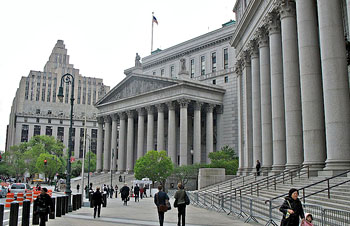Paul Waldman notes that New York state’s chief justice recently announced that judges have to recuse themselves if a lawyer arguing a case before the court has contributed more than $2,500 to one of the judge’s campaigns. You’d think that should  have been obvious all along, wouldn’t you? But not to everyone:
have been obvious all along, wouldn’t you? But not to everyone:
It’s true that the ability to buy a judge is not completely without limits, as we found in a case called Caperton v. Massey, involving the notorious mining company Massey Energy. Massey had recently been hit with a $50 million verdict in a lawsuit heading for West Virginia’s Supreme Court of Appeals, so the company’s chief, Don Blankenship, poured $3 million into the campaign of Brent Benjamin, a private attorney running for the first time, for chief justice in 2004. That amount was more than both campaigns spent combined. Benjamin ousted the sitting justice, and when the case reached the high court, Benjamin refused to recuse himself and cast the deciding vote in Massey’s favor, tossing out the $50 million award.
When the appeal reached the Supreme Court of the United States, the Court ruled that Benjamin should have recused himself. But what was so remarkable about the decision is that it wasn’t 9-0 or 8-1 but 5-4. Justices John Roberts, Antonin Scalia, Clarence Thomas, and Samuel Alito — the Court’s conservative bloc — actually thought it was OK for a judge to get $3 million from a defendant, then rule on that defendant’s lawsuit.
This, of course, is the case that inspired John Grisham’s The Appeal, which I highly recommend. Sure, it’s Grisham, and I know he’s not everyone’s cup of tea, but The Appeal is great liberal porn and it only takes a few hours to power through. You’ll enjoy it.

















